Reply To: General Discussion
[Lockias Chitanana] Thank you, colleagues, for your insightful posts.
I would like to acknowledge Ramon’s perspective that Teaching and Learning, or learning and teaching, does not necessarily follow a linear relationship. However, it might be too radical to completely disregard the connection between the two. Instead, I propose embracing transformative learning and teaching strategies, placing the student at the core of the learning experience.
Transformative teaching aims to create learning environments that facilitate transformative learning experiences. This involves implementing teaching methods that actively promote critical thinking, open dialogue, and reflective activities. In our roles as professors, we are tasked with establishing learning spaces wherein students feel secure challenging their own assumptions and participating in meaningful discussions with their peers. Crucial to this novel learning approach are elements such as disorienting dilemmas and critical reflection, which play a pivotal role in fostering transformative experiences for students.
Teaching, whether in formal or nonformal settings, ought to prioritize the learner. Discouraging the outdated concepts of the tabula rasa and the jug and mug approach, where the teacher is perceived as the sole repository of knowledge, is essential. Recognizing that learning transcends the boundaries of the classroom or laboratory, our focus should be on equipping learners with the ability to learn anytime and anywhere.
In this endeavour, technology, particularly the internet, proves invaluable in fostering communities of learning. The Internet assumes a crucial role in transformative teaching and learning by providing a rich tapestry of resources, promoting collaboration, and furnishing interactive platforms that enhance the educational experience.
I concur that learning is not solely dependent on a teacher’s presence. This acknowledgment stems from the understanding that individuals possess the capability to acquire knowledge and skills autonomously, without the direct guidance of a formal instructor. This aligns with the principles of self-directed learning, emphasizing that the learning process extends beyond traditional classroom confines.
However, it’s crucial to note that advocating for learning without a teacher doesn’t dismiss the value of teacher-facilitated learning. Rather, it underscores the evolving roles of educators and emphasizes the necessity to revamp the curriculum, along with the methods of assessment. This perspective prompts a reevaluation of the teacher’s role in fostering an environment where learners can thrive independently while also recognizing the importance of instructors in guiding and shaping educational experiences.
This is my two cents for now!






